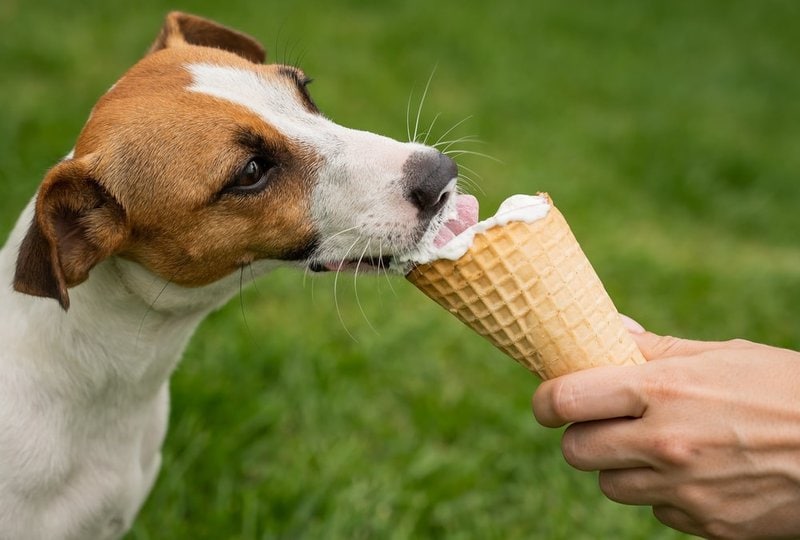We all have our days when we just want to grab that cake or ice cream in the fridge and gorge ourselves to satisfy our sweet tooth. But, do our dogs also have that sweet tooth, and can we share some of that sweet treats with our furry pets?
No, sugary concoctions or sweet treats are some things we should refrain from giving our dogs. Sugar is one of the foods that add empty calories to our pets’ diet. It does not offer any health benefits, like vitamins or minerals, and regular consumption would just throw their diets out of whack.
For this article, we will refer to sugar as your common table sugar or white granulated sugar that we usually add into our coffees, cakes, or cereals. This white stuff is crystallized sucrose extracted and refined from the juice of sugarcane.
In the following discussion, we will look into the various negative health issues that sugar does to our dogs’ bodies and the alternative foods that we can give our furry pets as a treat.
Can Dogs Eat Sugar?

No, while dogs need carbohydrates as a necessary component of their diet, and sugar is a carbohydrate, sugar does not offer any substantial benefits to our dogs.
Here are four reasons why sugar is not recommended for dogs:
Obesity
Consuming too much sugar has practically the same effect on dogs, just like what it has on humans. Various research has shown that excess sugar is directly linked to obesity.
Sugar packs a lot of calories and, unfortunately, mostly empty calories since they do not provide dogs with necessary nutrients like vitamins, minerals, antioxidants, or fiber. Excess calories are converted into unwanted fat and eventually lead to weight gain.
Obesity leads to other diseases down the road, such as heart disease is a primary example. Fatty material can easily accumulate and clog up the arteries and veins, taxing the heart to pump blood into the organs.
Other consequences of obesity include hypertension, strokes, osteoarthritis or faster degeneration of joints, respiratory diseases, and many forms of cancer.
In short, obesity not only shortens the life of your dog but also lessens its quality of life. As a result of weight gain, your dog would always be tired, not wanting to engage in physical activities. You’d also notice excessive panting and abdominal sagging.
If you notice that you cannot feel its ribs or spine when holding your dog, it can be a sign that your dog is putting on too much weight.
Diabetes
Sugar or sucrose is a simple carbohydrate made up of glucose and fructose.
When sugar breaks down, the glucose is converted into fuel or energy by insulin to be used by the body’s cells to function normally.
When there is excessive sugar in the bloodstream, the pancreas, which produces insulin, can get overworked over time and can either produce more or less of the insulin that would convert the sugars into energy.
Diabetes occurs when the glucose-insulin connection is not working properly. Unconverted glucose acts as a poison in the blood that could cause multiple organ damage, which often targets the kidney, liver, heart, nerves, and eyes.
Early signs of diabetes include excessive thirst and frequent urination due to the body’s way of getting rid of excess sugar.
Weight loss is also another early sign of diabetes because of the inefficiency of converting nutrients from food.
It should be noted that foods with a high glycemic index, like cakes, white bread, or ice cream, can rapidly increase a dog’s blood sugar level.
Dental Problems
Dogs do not have the enzyme amylase in their mouths to break down simple carbohydrates like sugars. The bacteria in their mouths just love that glucose, and when it gets excessive, more bacteria are multiplied.
These bacteria produce acid, and they eventually accumulate and stick to their teeth and gums, forming tartar and plaque.
Over time, the acid would eat away the enamel of the teeth, causing tooth cavities.
The buildup of bacteria in the mouth also causes your dog’s immune system to fight back, causing inflammation of the gums or gingivitis.
You must brush your dog’s teeth regularly to minimize the buildup of bacteria and get them checked annually by the veterinarian.
Digestive Imbalance
There are hundreds of beneficial bacteria and microorganisms, called the gut microbiome, present in your dog’s digestive tract.
These help in the breakdown of food, nutrient absorption, weight management, and even mental health.
When sugar is abundant in their stomach, the microbiome gets imbalanced and may cause indigestion, diarrhea, or vomiting. There are some instances when it can get explosive and may produce bloody stools.
What Sugars Are Toxic To Dogs?

Artificial sweeteners, like xylitol, are highly toxic to dogs. Even if a small amount is consumed, it can cause liver failure, hypoglycemia, seizures, and even death.
Some products contain xylitol, such as peanut butter, candies, and baked goods. So always check the labels before giving them to your dog.
What Sweets Can Dogs Eat?
Dogs can also taste sweet foods and may develop an addiction to them even though they have fewer taste buds than humans.
It can cause the same ‘sugar-high’ that we feel because our brain releases dopamine that makes us and our dogs feel good every time we taste that savory sweetness.
But, as discussed above, foods with granulated sugar offer minimal benefits, and it is better to give food with natural sweeteners as an occasional treat.
Fruits
Apples, bananas, and cantaloupes are some fruits that dogs may consume occasionally.
These fruits contain fructose, a simple sugar that occurs naturally in fruits, plus several vitamins, minerals, and fiber that offer health benefits to your dog.
Just stay away from avocados, grapes, and raisins since they are considered toxic to our furry pets.
Honey
Honey is another sugar substitute that has a host of health benefits like antibacterial and antifungal properties that is safe to give in small quantities.
It also contains some amount of vitamins and minerals. Be careful, though, with raw honey since some contain botulism spores.
Maple Syrup
This sweetener contains a fair amount of zinc and manganese that aids the immune system. But as with all sweeteners, a small amount is enough to prevent diabetes and obesity.






